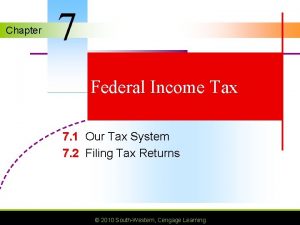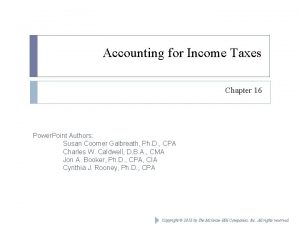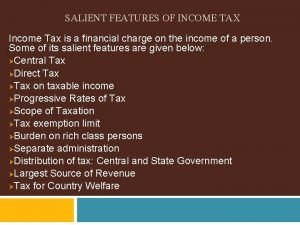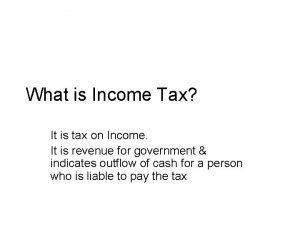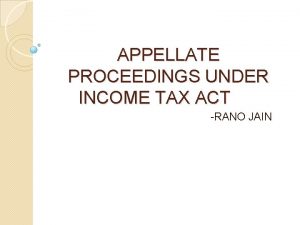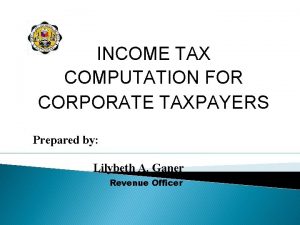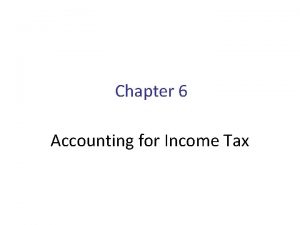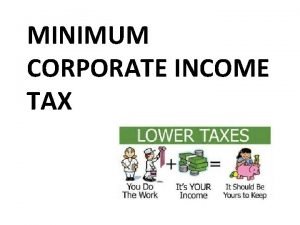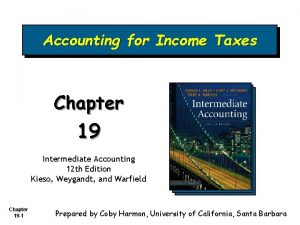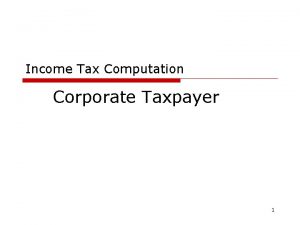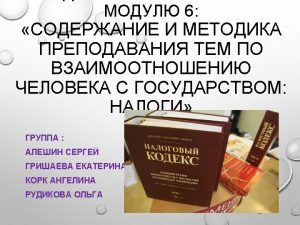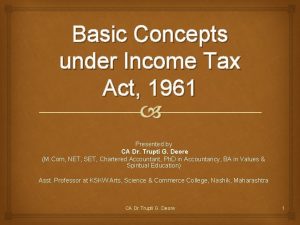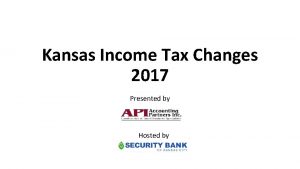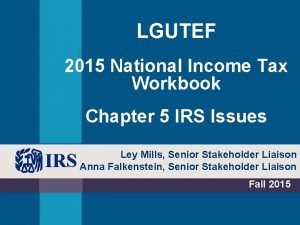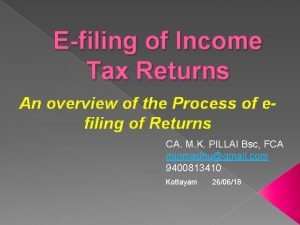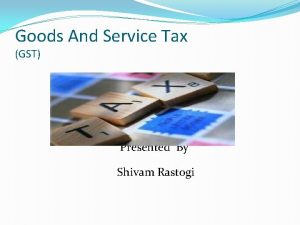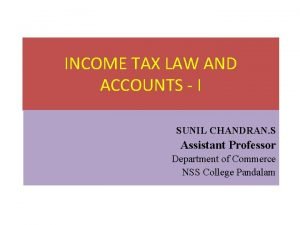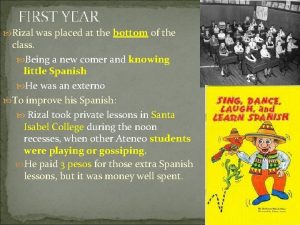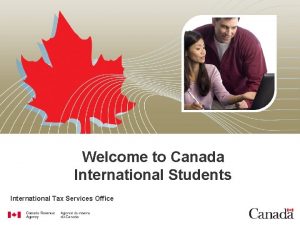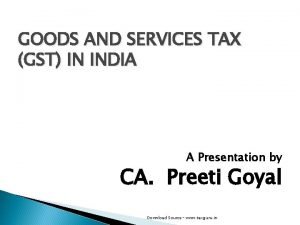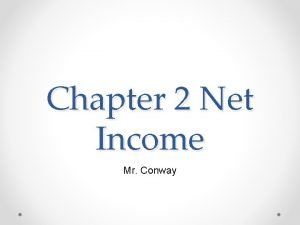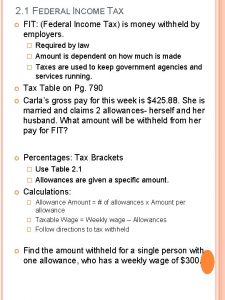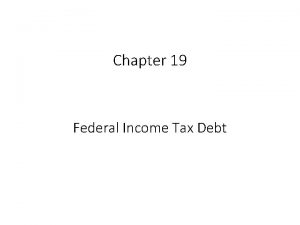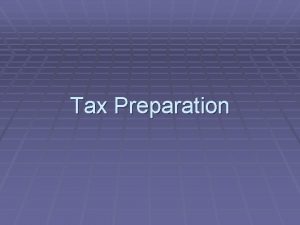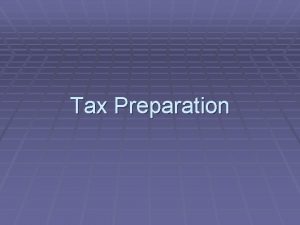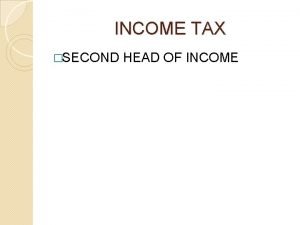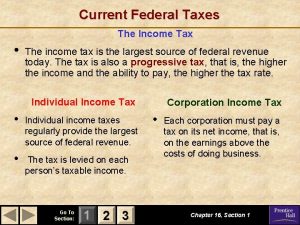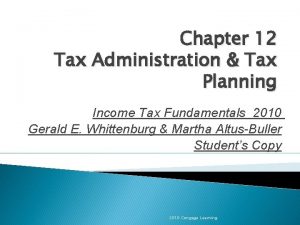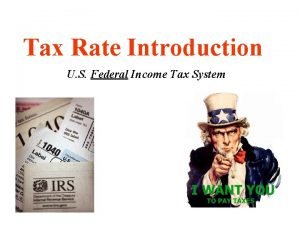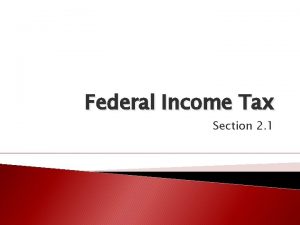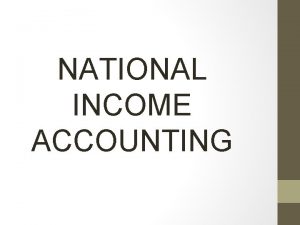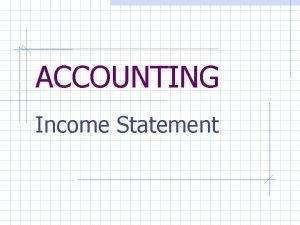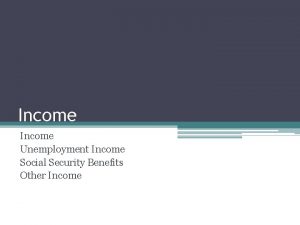TAX ISSUES FOR STUDENTS FEDERAL INCOME TAX DO







































- Slides: 39

TAX ISSUES FOR STUDENTS FEDERAL INCOME TAX

DO I HAVE TO FILE? Generally, if you had less income than the amount of your personal deduction(s) plus the standard deduction, you don’t have to file. However, if you are a wage earner, your employer likely withheld your taxes all year and you will want to file for refund purposes. Also, to take advantage of any student credits or deductions you must file. For tax year 2016, the personal exemption amount is $4, 050. If someone claims you as a dependent you may not take this. The personal exemption Filing Status Standard Deduction phases out for taxpayers with higher incomes. Single Married Filing Jointly Married Filing Separately Head of Household Qualifying Widow(er) $6, 300 $12, 600 $6, 300 $9, 300 $12, 600

LOGISTICS Filing Due Date: April 18, 2017 Forms: 1040, 1040 A, or 1040 ez Substantiation: generally, any expenses for which you claim a credit or deduction, it is important to keep record of both the type of expense (invoice, receipt, etc. ) and that the expense was actually paid by you (bank statement, credit card statement, etc. ).

AMENDING – FORM 1040 X Should you realize that you made a mistake on a previously filed return, either to your benefit or detriment, you may want to amend your filing. If the IRS discovers any mistakes underreporting tax liability, you may be hit with interest and civil penalties for underpayment and inaccuracy. Statute of Limitations: 3 years from the later of (a) April 15 following the tax year at issue or (b) the actual date of filing for the year at issue. This statute applies to both your ability to amend and get a refund, and the IRS’s ability to audit and determine your payment was deficient.

SCHOLARSHIPS AND FELLOWSHIPS INCLUDING: ATHLETIC SCHOLARSHIPS, FULBRIGHT GRANTS, PELL GRANTS, AND OTHER TITLE IV NEED-BASED EDUCATION GRANTS

SCHOLARSHIPS AND FELLOWSHIPS: GENERALLY Generally, funds received from a scholarship and fellowship are tax free (excludable from gross income) only if you are a candidate for a degree at an eligible educational institution. Funds received are tax free only to the extent: they don't exceed your qualified education expenses; the scholarship/fellowship isn't designated or earmarked for other purposes (such as room and board), and doesn't require (by its terms) that it can't be used for qualified education expenses; and the scholarship/fellowship doesn't represent payment for teaching, research, or other services required as a condition for receiving the scholarship. If and to the extent your scholarship or fellowship grant doesn't meet these requirements, it is taxable and must be included in gross income *Special rules apply to U. S. citizens and resident aliens who have received scholarships or fellowship grants for studying, teaching, or researching abroad. (See Pub. 54, Tax Guide for U. S. Citizens and Resident Aliens Abroad)

QUALIFIED EDUCATION EXPENSES INCLUDES: Tuition and fees required to enroll at or attend an eligible educational institution; and Course-related expenses, such as fees, books, supplies, and equipment that are required for the courses at the eligible educational institution. Must be required of all students in the course EXCLUDES: Room and board, Travel, Research, Clerical help, or Equipment and other expenses that aren't required for enrollment in or attendance at an eligible educational institution.

AMERICAN OPPORTUNITY CREDIT FORMERLY: HOPE SCHOLARSHIP CREDIT

Maximum credit Up to $2, 500 credit per eligible student Limit on modified adjusted gross income (MAGI) $180, 000 if married filing jointly; $90, 000 if single, head of household, or qualifying widow(er) Refundable or nonrefundable 40% of credit may be refundable; the rest is nonrefundable Number of years of postsecondary education Available ONLY if the student had not completed the first 4 years of postsecondary education before 2016 (generally, the freshman through senior years, determined by the eligible educational institution, not including academic credit awarded solely because of the student's performance on proficiency examinations) Number of tax years credit available Available ONLY for 4 tax years per eligible student (including any year(s) Hope scholarship credit was claimed) Type of program required Student must be pursuing a program leading to a degree or other recognized education credential Number of courses Student must be enrolled at least half-time for at least one academic period that begins during 2016 (or the first 3 months of 2017 if the qualified expenses were paid in 2016) Felony drug conviction As of the end of 2016, the student had not been convicted of a felony for possessing or distributing a controlled substance Qualified expenses Tuition, required enrollment fees, and course materials that the student needs for a course of study whether or not the materials are bought at the educational institution as a condition of enrollment or attendance Payments for academic periods Payments made in 2016 for academic periods beginning in 2016 or beginning in the first 3 months of 2017

AMERICAN OPPORTUNITY CREDIT (AOTC) Tax credit that offsets the costs of higher education by directly reducing the amount of your income tax Allows a taxpayer to claim a credit of up to $2, 500 for adjusted qualified education expenses paid for each student who qualifies For each student incurring qualified education expenses, a taxpayer can elect for any tax year only one of the education credits This credit is refundable, meaning a taxpayer can get up to 40% ($1, 000) of it even if they owe no tax. A taxpayer can claim the American opportunity credit by completing Form 8863 and submitting it with Form 1040 or 1040 A. Enter the nonrefundable part of the credit on Form 1040, line 50, or on Form 1040 A, line 33. Enter the refundable part of the credit on Form 1040, line 68, or on Form 1040 A, line 44.

AOTC: CALCULATION The amount of the American opportunity credit (per eligible student) is the sum of: 100% of the first $2, 000 of qualified education expenses you paid for the eligible student, and 25% of the next $2, 000 of qualified education expenses you paid for that student. The maximum amount of American opportunity credit you can claim in 2016 is $2, 500 multiplied by the number of eligible students. You can claim the full $2, 500 for each eligible student for whom you paid at least $4, 000 of adjusted qualified education expenses

AOTC: ELIGIBLE STUDENTS Have not claimed the AOTC (or Hope Scholarship Credit) in more than three prior tax years. The student didn't have expenses that were used to figure an American opportunity credit in any 4 earlier tax years. This includes any tax year(s) in which you claimed the Hope scholarship credit for the same student. Have not completed the first 4 years of postsecondary education before 2016. Generally, freshman through senior years of undergrad Were enrolled in a program leading to a degree, certificate, or other recognized educational credential at least half-time for at least one academic period beginning in 2016 (or the first 3 months of 2017 if the qualified expenses were paid in 2016) Have not been convicted of any federal or state felony for possessing or distributing a controlled substance as of the end of 2016.

AOTC: WHO CAN CLAIM THE CREDIT? Generally, you can claim the American opportunity credit if: You pay qualified education expenses of higher education; and You pay the education expenses for an eligible student; and The eligible student is either yourself, your spouse, or a dependent for whom you claim an exemption on your tax return. You may not claim the AOTC if: Your filing status is married filing separately; or You are claimed as a dependent on another person's tax return; or Your modified adjusted gross income (MAGI) is $90, 000 or more ($180, 000 or more if married filing jointly) You (or your spouse) were a nonresident alien for any part of 2016 and the nonresident alien didn't elect to be treated as a resident alien for tax purposes. You didn't have an SSN (or ITIN) by the due date of your 2016 return (including extensions), you can't claim the American opportunity credit on either your original or an amended 2016 return, even if you later get an SSN (or ITIN). Also, you can't claim this credit on your original or an amended 2016 return for a student who didn't have an SSN, ATIN, or ITIN by the due date of your return (including extensions), even if the student later gets one of those numbers.

AOTC: DEPENDENTS Expenses paid by your dependent: includable when figuring the amount of your American opportunity credit if you claim an exemption on your tax return for an eligible student who is your dependent The IRS treats any expenses paid (or deemed paid) by a dependent as if you had paid them. Qualified education expenses paid directly to an eligible educational institution for your dependent under a court-approved divorce decree are treated as paid by your dependent. Expenses paid by you: If you claim an exemption for a dependent who is an eligible student, only you can include any expenses you paid when figuring the amount of the American opportunity credit. Only the student can include any expenses you paid when figuring the American opportunity credit, unless you or a third party claims the student as dependent Expenses paid by others: Someone other than you, your spouse, or your dependent (such as a relative or former spouse) may make a payment directly to an eligible educational institution to pay for an eligible student's qualified education expenses. The IRS treats these expenses paid by third parties as though the student received the money and paid the institution you are considered to have paid the expenses.

Do I qualify for the AOTC? A flow chart created by the IRS No Did you pay qualified education expenses in 2016 for an eligible student? * Yes Did the academic period for which you paid qualified education expenses begin in 2016 or the first 3 months of 2017? No Yes Is the eligible student you, your spouse (if married filing jointly), or your dependent for whom you claim an exemption on your tax return? No Yes *Qualified education expenses paid by a dependent for whom you claim an exemption, or by a third party for that dependent, are considered paid by you. **Your education credits may be limited to your tax liability minus certain credits. See Form 8863 for more details. Yes Are you listed as a dependent on another person’s tax return? No Yes Is your filing status married filing separately? No For any part of 2016, were you (or your spouse) a nonresident alien who didn’t elect to be treated as a resident alien for tax purposes? Yes No Is your modified adjusted gross income (MAGI) less than $90, 000 ($180, 000 if married filing jointly)? No Yes Did you use the same expenses to claim a deduction or credit? No Were the same expenses paid entirely with a tax-free scholarship, grant, or employer-provided educational assistance? Yes No Did you or someone else receive a refund of all the expenses? No You can claim the American opportunity credit for 2016. ** Yes You can’t claim the American opportunity credit for 2016.

AOTC: QUALIFIED EDUCATION EXPENSES INCLUDES amounts paid for: Tuition Books, supplies, and equipment needed for a course of study, whether or not they are purchased from the educational institution. Student activity fees that must be paid to the institution as a condition of enrollment or attendance All qualified expenses not refunded when a student withdraws from classes EXCLUDES amounts paid for: insurance; medical expenses (including student health fees); room and board; transportation; or similar personal, living, or family expenses; any course of instruction or other education that involves sports, games, or hobbies, or any noncredit course. This is true even if the amount must be paid to the institution as a condition of enrollment or attendance. Reduce the qualified educational expenses for each academic period by the amount of tax-free educational assistance allocable to that academic period Don't reduce qualified education expenses by amounts paid with funds the student receives as: payment for services, such as wages; a loan; a gift; an inheritance; or a withdrawal from the student's personal savings.

LIFETIME LEARNING CREDIT

Maximum credit Up to $2, 000 credit per return Limit on modified adjusted gross income (MAGI) $131, 000 if married filling jointly; $65, 000 if single, head of household, or qualifying widow(er) Refundable or nonrefundable Nonrefundable—credit limited to the amount of tax you must pay on your taxable income Number of years of postsecondary education Available for all years of postsecondary education and for courses to acquire or improve job skills Number of tax years credit available Available for an unlimited number of tax years Type of program required Student doesn't need to be pursuing a program leading to a degree or other recognized education credential Number of courses Available for one or more courses Felony drug convictions don't make the student ineligible Qualified expenses Tuition and fees required for enrollment or attendance (including amounts required to be paid to the institution for course-related books, supplies, and equipment) Payments for academic periods Payments made in 2016 for academic periods beginning in 2016 or beginning in the first 3 months of 2017

LIFETIME LEARNING CREDIT For each student incurring qualified education expenses, a taxpayer can elect for any tax year only one of the education credits You claim the lifetime learning credit by completing Form 8863 and submitting it with your Form 1040 or 1040 A. Enter the credit on Form 1040, line 50, or Form 1040 A, line 33. The amount of the lifetime learning credit is 20% of the first $10, 000 of qualified education expenses you paid for all eligible students.

LIFETIME LEARNING CREDIT: ELIGIBLE STUDENT Any student who is enrolled in one or more courses at an eligible educational institution Eligible Educational Institution: any college, university, vocational school, or other postsecondary educational institution eligible to participate in a student aid program administered by the U. S. Department of Education

LIFETIME LEARNING CREDIT: WHO CAN CLAIM? Can claim if: You pay qualified education expenses of higher education; and You pay the education expenses for an eligible student; and The eligible student is either yourself, your spouse, or a dependent for whom you claim an exemption on your tax return. Can’t claim if: Married filing separately; or You are listed as a dependent on another person's tax return; or Your modified adjusted gross income (MAGI) is $65, 000 or more ($131, 000 or more if filing married filing jointly) You (or your spouse) were a nonresident alien for any part of 2016 and the nonresident alien didn't elect to be treated as a resident alien for tax purposes. (See Pub. 519). You claim the American Opportunity Credit or a Tuition and Fees Deduction for the same student in 2016.

LIFETIME LEARNING CREDIT: DEPENDENTS Expenses paid by your dependent: includable when figuring the amount of your Lifetime Learning credit if you claim an exemption on your tax return for an eligible student who is your dependent The IRS treats any expenses paid (or deemed paid) by a dependent as if you had paid them. Qualified education expenses paid directly to an eligible educational institution for your dependent under a court-approved divorce decree are treated as paid by your dependent. Expenses paid by you: If you claim an exemption for a dependent who is an eligible student, only you can include any expenses you paid when figuring the amount of the Lifetime Learning credit. Only the student can include any expenses you paid when figuring the Lifetime Learning credit, unless you or a third party claims the student as dependent. Expenses paid by others: Someone other than you, your spouse, or your dependent (such as a relative or former spouse) may make a payment directly to an eligible educational institution to pay for an eligible student's qualified education expenses. The IRS treats these expenses paid by third parties as though the student received the money and paid the institution you are considered to have paid the expenses.

Do I qualify for the Lifetime Learning Credit? A flow chart created by the IRS *Qualified education expenses paid by a dependent for whom you claim an exemption, or by a third party for that dependent, are considered paid by you. **Your education credits may be limited to your tax liability minus certain credits. See Form 8863 for more details.

LIFETIME LEARNING CREDIT: QUALIFIED EXPENSES INCLUDES amounts paid for: Tuition Student activity fees, books, supplies, and equipment needed for a course of study, only if the fees and expenses must be paid to the institution for enrollment or attendance All qualified expenses not refunded when a student withdraws from classes EXCLUDES amounts paid for: insurance; medical expenses (including student health fees); room and board; transportation; or similar personal, living, or family expenses; any course of instruction or other education that involves sports, games, or hobbies, or any noncredit course. This is true even if the amount must be paid to the institution as a condition of enrollment or attendance. Reduce the qualified educational expenses for each academic period by the amount of tax-free educational assistance allocable to that academic period Don't reduce qualified education expenses by amounts paid with funds the student receives as: payment for services, such as wages; a loan; a gift; an inheritance; or a withdrawal from the student's personal savings.

DEDUCTION FOR TUITION AND FEES

Question Answer What is the maximum benefit? You can reduce your income subject to tax by up to $4, 000. What is the limit on modified adjusted gross income (MAGI)? $160, 000 if married filing a joint return; $80, 000 if single, head of household, or qualifying widow(er). Where is the deduction taken? As an adjustment to income on Form 1040 or Form 1040 A. For whom must the expenses be paid? A student enrolled in an eligible educational institution who is either: • you, • your spouse, or • your dependent for whom you claim an exemption. What tuition and fees are deductible? Tuition and fees required for enrollment or attendance at an eligible postsecondary educational institution, but not including personal, living, or family expenses, such as room and board.

TUITION AND FEES DEDUCTION: WHO CAN CLAIM? Generally, you can claim if: You pay qualified education expenses of higher education; and You pay the education expenses for an eligible student; and The eligible student is yourself, your spouse, or your dependent for whom you claim an exemption on your tax return Cannot claim if: Married filing separately. Another person can claim an exemption for you as a dependent on his or her tax return, regardless of whether or not they actually claim the exemption. Your modified adjusted gross income (MAGI) is more than $80, 000 ($160, 000 if filing a joint return). You (or your spouse) were a nonresident alien for any part of 2016 and the nonresident alien didn't elect to be treated as a resident alien for tax purposes. (See Pub. 519).

TUITION & FEES DEDUCTION: QUALIFIED EDUCATION EXPENSES INCLUDES amounts paid for: Tuition Student activity fees, books, supplies, and equipment needed for a course of study, only if the fees and expenses must be paid to the institution for enrollment or attendance All qualified expenses not refunded when a student withdraws from classes EXCLUDES amounts paid for: insurance; medical expenses (including student health fees); room and board; transportation; or similar personal, living, or family expenses; any course of instruction or other education that involves sports, games, or hobbies, or any noncredit course. This is true even if the amount must be paid to the institution as a condition of enrollment or attendance. Reduce the qualified educational expenses for each academic period by the amount of tax-free educational assistance allocable to that academic period Don't reduce qualified education expenses by amounts paid with funds the student receives as: payment for services, such as wages; a loan; a gift; an inheritance; or a withdrawal from the student's personal savings.

TUITION & FEES DEDUCTION: DEPENDENTS Generally, in order to claim the tuition and fees deduction for qualified education expenses for a dependent, you must: Have paid the expenses, and Claim an exemption for the student as a dependent. For you to be able to deduct qualified education expenses for your dependent, you must claim an exemption for that individual. You do this by listing your dependent's name and other required information on Form 1040 (or Form 1040 A), line 6 c. Expenses paid by dependent: If your dependent pays qualified education expenses no one can take a tuition and fees deduction for those expenses. You aren't treated as paying any expenses actually paid by a dependent for whom you or anyone other than the dependent can claim an exemption Expenses paid by you: Only you can include any expenses you paid when figuring your tuition and fees deduction Expenses paid under divorce decree: qualifying expenses paid directly to an eligible educational institution for a student under a court-approved divorce decree are treated as paid by the student only he/she would be eligible to take the deduction and only if no one else could claim an exemption for the student. Expenses paid by others: A 3 rd party make a payment directly to an eligible educational institution to pay for an eligible student's qualified education expenses; the student is treated as paying the institution only he/she would be eligible to take the deduction and only if no one else could claim an exemption for the student

DEDUCTION FOR STUDENT LOAN INTEREST

Feature Description Maximum benefit You can reduce your income subject to tax by up to $2, 500. Loan qualifications Your student loan: • must have been taken out solely to pay qualified education expenses, and • can't be from a related person or made under a qualified employer plan. Student qualifications The student must be: • you, your spouse, or your dependent; and • enrolled at least half-time in a program leading to a degree, certificate, or other recognized educational credential at an eligible educational institution. Limit on modified adjusted gross income (MAGI) $160, 000 if married filing a joint return; $80, 000 if single, head of household, or qualifying widow(er).

DEDUCTING STUDENT LOAN INTEREST PAID This deduction is claimed as an adjustment to income, which means you are not required to itemize deduction on Schedule A to claim it. Loans from Relatives: A taxpayer cannot deduct interest on a loan from a related person. Such person includes: A spouse; Brothers and sisters; Half brothers and half sisters; Ancestors (parents, grandparents, etc. ); Lineal descendants (children, grandchildren, etc. ); and Certain corporations, partnerships, trusts, and exempt organizations.

STUDENT LOAN INTEREST: QUALIFIED EDUCATION EXPENSES The total costs of attending an eligible educational institution, including graduate school, including: Tuition and fees. Room and board; to the extent the expense is no more than: The allowance for room and board that was included in the cost of attendance If greater, the actual amount charged if the student is residing in housing owned or operated by the eligible educational institution Books, supplies, and equipment. Other necessary expenses (such as transportation).

STUDENT LOAN INTEREST: WHO CAN CLAIM THE DEDUCTION? Generally, you can claim the deduction if all of the following requirements are met. Your filing status is any filing status except married filing separately. No one else is claiming an exemption for you on his or her tax return. You are legally obligated to pay interest on a qualified student loan. You paid interest on a qualified student loan. Interest paid by others: if you are the person legally obligated to make interest payments and someone else makes a payment of interest on your behalf, and they don’t claim you as a dependent, then you are treated as paying the interest.

NO DOUBLE BENEFITS AOTC–A taxpayer may not: Deduct higher education expenses on your income tax return (as, for example, a business expense) and also claim an American opportunity credit based on those same expenses. Claim an American opportunity credit in the same year that you are claiming a tuition and fees deduction for the same student. Claim an American opportunity credit for any student and use any of that student's expenses in figuring your lifetime learning credit. Figure the tax-free portion of a distribution from a Coverdell education savings account (ESA) or qualified tuition program (QTP) using the same expenses you used to figure the American opportunity credit. Claim a credit based on qualified education expenses paid with tax-free educational assistance, such as a scholarship, grant, or assistance provided by an employer. Lifetime Learning Credit–A taxpayer may not: Deduct higher education expenses on your income tax return (as, for example, a business expense) and also claim a lifetime learning credit based on those same expenses. Claim a lifetime learning credit in the same year that you are claiming a tuition and fees deduction for the same student. Claim a lifetime learning credit for any student and use any of that student's expenses in figuring your American opportunity credit. Claim a lifetime learning credit based on the same expenses used to figure the tax-free portion of a distribution from a Coverdell education savings account (ESA) or qualified tuition program (QTP). Claim a credit based on qualified education expenses paid with tax-free educational assistance, such as a scholarship, grant, or assistance provided by an employer. T&F Deduction–A taxpayer may not: Deduct qualified education expenses you deduct under any other provision of the law, for example, as a business expense. Deduct qualified education expenses for a student on your income tax return if you or anyone else claims an American opportunity or lifetime learning credit for that same student in the same year. Deduct qualified education expenses that have been used to figure the tax-free portion of a distribution from a Coverdell education savings account (ESA) or a qualified tuition program (QTP) (only tax-free earnings, not recovery contribution) Deduct qualified education expenses that have been paid with tax-free interest on U. S. savings bonds (Form 8815). Deduct qualified education expenses that have been paid with tax-free educational assistance, such as a scholarship, grant, or assistance provided by an employer.

VETERANS BENEFITS Payments you receive for education, training, or subsistence under any law administered by the Department of Veterans Affairs (VA) are tax free. Don't include these funds as income on your federal tax return If you qualify for one or more of the education tax benefits, you may have to reduce the amount of education expenses qualifying for a specific tax benefit by part or all of your VA payments. This applies only to the part of your VA payments that is required to be used for education expenses.

MISCELLANEOUS Bar /MPRE Exam Fees Professional accreditation fees are not deductible as miscellaneous deductions However, you may deduct membership dues. See https: //www. irs. gov/publications/p 17/ch 28. html Bar /MPRE Review Courses These review courses are not deductible because they are part of a program of study that can qualify you for a new profession These are not offered by eligible educational institutions so they do not qualify for the American Opportunity Credit, Lifetime Learning Credit, or the Tuition and Fees deduction. See https: //www. irs. gov/publications/p 17/ch 2 7. html#en_US_2016_publink 100017401 1

WHERE TO FIND FORMS AND INSTRUCTIONS Form 1040, Form 1040 EZ All IRS forms located at www. irs. gov All IL forms located at http: //www. revenue. state. il. us/taxforms/Incm. Current. Year/Individual/ Use the federal and state instructions to determine your filing requirements. *Turbo tax offers free online filing for individuals filing their personal income tax and not itemizing deductions.

FOR MORE: Foreign Financial Interests: https: //www. irs. gov/uac/foreign-financial- accounts-reporting-requirements Healthcare: https: //www. irs. gov/pub/irs-pdf/p 974. pdf Student Specific Issues Detailed: https: //www. irs. gov/pub/irs-pdf/p 970. pdf Federal Income Tax 2016 Tax Guide: https: //www. irs. gov/pub/irs- pdf/p 17. pdf Nonresident Students: https: //www. irs. gov/individuals/international-taxpayers/taxation-of-nonresident- aliens https: //icc. mit. edu/sites/default/files/documents/MIT%202015%20 tax%20 presen tation%20 International%20 Students. pdf
 Chapter 7 federal income tax
Chapter 7 federal income tax How to compute federal income tax
How to compute federal income tax Chapter 16 accounting for income taxes
Chapter 16 accounting for income taxes How to calculate real gdp per capita
How to calculate real gdp per capita Deferred tax asset and liability
Deferred tax asset and liability Operating income formula
Operating income formula Salient features of income tax
Salient features of income tax Income tax slabs
Income tax slabs Form 35 income tax
Form 35 income tax Mcit computation example
Mcit computation example Means
Means Income tax expense
Income tax expense 195 of income tax act
195 of income tax act What is mcit in taxation
What is mcit in taxation Income tax expense
Income tax expense Income tax computation format
Income tax computation format Income tax in russia
Income tax in russia How to file income tax return in winman software
How to file income tax return in winman software Income tax meaning
Income tax meaning Kansas income tax rates
Kansas income tax rates National income tax workbook
National income tax workbook Efilingofincometax
Efilingofincometax James wilson income tax
James wilson income tax Movable assets
Movable assets Nccpl
Nccpl Income tax meaning
Income tax meaning Perquisites in income tax
Perquisites in income tax Rumusan pengiktirafan hasil dan belanja
Rumusan pengiktirafan hasil dan belanja Easyoffice
Easyoffice Personal issues of students
Personal issues of students Example of personal issues
Example of personal issues Rizal participated in the student demonstration in madrid
Rizal participated in the student demonstration in madrid Welcome canada amount for international students
Welcome canada amount for international students Turbo tax simulation
Turbo tax simulation Gst percentage in india
Gst percentage in india Find the local tax deducted: $456 biweekly, 2 1/2 % tax.
Find the local tax deducted: $456 biweekly, 2 1/2 % tax. A gastrica
A gastrica Boverket ka
Boverket ka Strategi för svensk viltförvaltning
Strategi för svensk viltförvaltning Novell typiska drag
Novell typiska drag
